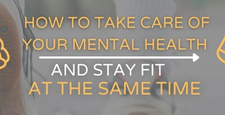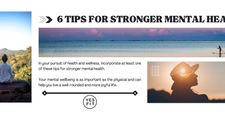Top 6 Tips to Help with Holiday Stress
Stress can greatly interfere with our mental health, leaving us feeling anxious and depressed. In fact, according to the American Institute of Stress, 83% of workers in the United States suffer from work-related stress. With the holidays and just how different everything is in 2020, it only amplifies the overwhelmed feeling. Learning to deal with stress can help you avoid becoming a statistic.
What is Stress?
While stress feels like a mental state and can cause emotional issues, it impacts both mental and physical health. Stress is a reaction that results in physical responses that may include upset stomach, headache, and elevated blood pressure. While some stress can have a positive impact by making us more alert, chronic, low-level stress can interfere with your work, relationships, and health. The following are some tips to help you learn to deal with stress and protect your physical and mental health.
1. Eating Right
Stress affects us both mentally and physically, and our hormones hold a lot of sway in how we handle stress. It just so happens that eating well can limit hormones that add to stress while increasing feel-good hormones like serotonin or dopamine.
Bananas are healthy hormone food that contains dopamine, which is a mood-boosting hormone. Carbohydrates in whole grain products can help increase serotonin levels, which increases feelings of happiness and wellbeing. Some fish like salmon can provide healthy fats that the brain requires for improved brain function.
During the holidays, tempting sweet treats and comfort are at every table. Moderation is always your friend here. You can indulge with your friends and family. Try to eat a small power snack packed with lean protein to help fill you up.

2. Exercise
While it may be true that exercise creates its type of stress, it is also one of the best ways to combat chronic mental stress. That’s because it can help lower stress hormones like cortisol while increasing endorphin release, which are natural painkillers that create the elevated feeling many endurance athletes enjoy.
Incorporating a daily exercise routine can also boost self-esteem and improve sleep, both of which contribute to lower stress levels. If you don’t exercise now, begin with a short 20-minute walk or home exercise routine. Double the anti-stress impact by walking in nature and let ecotherapy improve your heart rate, blood pressure, and feelings of wellbeing. (1)
Don't forget that with the Yes.Fit app you can get your holiday fun with the 12 Days of Fitness or even finish the year with a bang with the New Year 2021 race.
.png)
3. Meditation
Meditation is easy to practice and has an excellent track record for reducing anxiety and stress. According to a study published in Psychotherapy and Psychosomatics, mindful meditation increases a sense of control while providing an overall lessening of the symptoms of stress.
To practice mindful meditation, set aside 10 to 20 minutes and find a quiet place to sit comfortably. As you relax into your position, close your eyes, and focus on calming and relaxing each area of your body beginning with your feet up to your head.
When your mind wanders, bring it back to relaxing your body or counting your breaths from one to four. You will be able to relax your mind easier with practice and soon experience the benefits of this wonderful meditation.
With the holidays, sometimes we over extend ourselves to please others. Communicating your boundaries to your loved ones and giving yourself time to practice self-care is important to not feel drained and overwhelmed.
4. Deep Breathing
Deep breathing is one of the oldest techniques that helps the body physically relax. When stressed, breathing becomes shallow and rapid as your body gets ready for fight or flight.
On the other hand, deep breathing sends a signal to the brain to relax while it also increases oxygen intake and relaxes blood vessels.
Anytime you feel stressed, stop for a moment and take a few, slow deep breaths. Allow the tension to leave with your exhaled breath and feel your body relax. If you can, take 10-20 minutes at the end of each day to perform a deep breathing meditation practice.
Simply sit in a quiet place with your eyes closed and allow your mind to be clear of thoughts as you focus on deep, even, and calm breathing.
-1.png)
5. Journaling Your Thoughts
Journaling is an exercise of writing out your thoughts in a journal. Studies show that journaling serves as an emotional release and can help create a more positive outlook by reducing negativity. One study published in the American Medical Association showed participants with chronic illness experienced better health and fewer symptoms than those who did not journal.
To get full benefits from this practice, find a quiet spot to relax and write out your thoughts for just a few minutes each day. Benefits are noticed when this is done for at least four, consecutive days. What you write is very individual and can include anything from your daily thoughts, practices, and future goals.
Use journaling as a time to remind yourself of the positive aspects of your life, and write out your frustrations when you feel like it. Each day before you write again, try to take a few minutes to read previous entries and see how your thoughts and feelings evolve. Mostly, enjoy the process and use this as a time to relieve stress and relax.
6. Practice Gratitude
Sometimes life becomes so difficult that it is hard to remember the good things. Practicing gratitude can open up areas of your brain and create new neurological pathways that allow you to see the world in a better light. This is called neuroplasticity and it is a process that is natural to our brain. And the best part is that it can be used to intentionally reduce stress.
While it is a complex process, the short version of neuroplasticity is that your brain creates pathways or connections that influence thoughts and feelings and aids in memory recall.
These pathways become the habit of how we think, so if you are in the habit of seeing the negative, your brain will always recognize the negative. On the other hand, if you practice positive thinking, your brain will rewire the connections and you will soon begin to see the positive in your life.
Try starting each day by mentally listing everything you are grateful for before you get out of bed. Learning a new way of thinking can help you recognize more opportunities and positive outcomes, thus reducing stress. And the best part? The more things you find to be grateful for in your life, the more you will see, leading to an overall happier outlook on life.
Practice Makes Perfect
Stress management includes a series of techniques that should be implemented over time. The tips above are just a few that can help guide you through relieving stress and improving your overall outlook on life. Practice with persistence, and most of all, try to enjoy the process.
Don't forget Coach CC discusses this topic in more detail on this week's podcast. She will be expanding on some of the seasonal causes as well as more festive remedies.





















